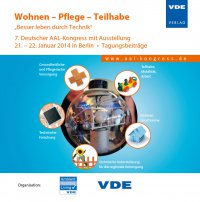Quantitative and qualitative rating and ranking studies for consolidation of an application portfolio for large scale pilots
Conference: Wohnen – Pflege – Teilhabe – „Besser leben durch Technik“ - 7. Deutscher AAL-Kongress mit Ausstellung
01/21/2014 - 01/22/2014 at Berlin, Deutschland
Proceedings: Wohnen – Pflege – Teilhabe – „Besser leben durch Technik“
Pages: 3Language: englishTyp: PDF
Personal VDE Members are entitled to a 10% discount on this title
Authors:
Nap, Henk Herman; Berlo, Ad van (Smart Homes, PO Box 8825, 5605 LV Eindhoven, The Netherlands)
Wichert, Reiner (Fraunhofer IGD, Fraunhoferstr. 5, 64283 Darmstadt, Germany)
Abstract:
The ReAAL project intends to deploy a critical mass of Ambient Assisted Living applications and services for ca. 7000 users in seven EU countries, based upon the universAAL platform, previously developed with EC support, with the intent of kick-starting the market for interoperable AAL services, applications and devices. ReAAL will facilitate the emergence of an AAL ecosystem by showing the platform usefulness, and spreading the related technical knowledge through an associated community of interest. Here, ReAAL will establish a multi-dimension evaluation methodology to measure the impact of the deployment of the AAL ecosystem in terms of the social, economic and health indicators. Whether health, safety, comfort, social integration or support of mobility – assistance might be needed in any possible aspect of daily life. From an investment point of view, the AAL market should allow individuals in danger of losing independence to pick the set of applications and services of Ambient Assisted Living (AAL) over time in conjunction with actual needs, as they arise. Open platforms are supposed to be the enabler for such gradual system evolution and support products and services to become more affordable, future-proof, adaptable, and accessible. The ReAAL project investigates these assumptions via a number of pilots, each with a different focus. If the platform’s usefulness can be shown and the related technical knowledge is spread to an associated community of interest, a self-organizing AAL ecosystem will emerge, from which diverse stakeholders will benefit: application and technology vendors, service providers, public authorities and policy makers, sponsors, and the consumer masses, foremost those people who wish to be able to avoid dependency on nursing homes, preferring to continue to live independently in their own homes.


